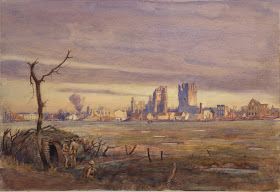 |
| Land Girl Ploughing, Cecil Aldin, © IWM (Art.IWM ART 2618) |
Despite
the need for women workers, resistance was high. Those with traditional values viewed the Land
Girls’ uniform trousers as disgraceful cross-dressing. In response, the
government issued posters that celebrated the women’s patriotic efforts and
feminized the new roles in an attempt to change public attitudes.*
Rose
Macaulay, the daughter of a Cambridge professor, volunteered with the Women’s
Land Army (WLA) in 1916. Working at Station
Farm outside Cambridge, Macaulay wryly wrote of her experiences in the poem
“Spreading Manure.”
Spreading
Manure
There are
fifty steaming heaps in the One Tree field,
They must all be spread out ere the earth will yield
As it should (and it won’t, even then).
Drive the
great fork in, fling it out wide;
Jerk it with a shoulder throw.
The stuff
must lie even, two feet on each side,
Not in patches, but level -- so.
When the
heap is thrown you must go all round
And flatten it out with the spade,
It must
lie quite close and trim till the ground
Is like bread spread with marmalade.
The
north-east wind stabs and cuts our breath;
The soaked clay numbs our feet.
We are
palsied, like people gripped by death,
In the beating of the frozen sleet.
Sitting in the Flanders mud.
I wish I was
out there, for it might be
A shell would burst to heat my
blood.
I wish I
was out there, for I should creep
In my
dug-out, and hide my head,
I should
feel no cold when they laid me deep
To sleep in a six-foot bed.
I wish I
was out there, and off the open land:
A deep trench I could just endure.
But
things being other, I needs must stand
Frozen, and spread wet manure.
The first
three stanzas give a sense of the tedium of the work: fifty steaming piles of
dung must be forked, lifted, and flung before the stinking excrement can be evenly
smoothed across the field “like bread spread with marmalade.” The simile
ironically highlights the contrast between the typical domestic sphere of women
and the work of the Land Girls, and the image linking manure with marmalade is
both apt and disgusting.
 The last
four stanzas use wry humor to highlight a similarity that is even more shocking
and disturbing: Macaulay dares to compare the discomforts of the Land Girls’
work with the conditions of the men on the front lines of battle. Both the soldiers and the Land Girls battle
the cold and wallow in the frozen mud.
But “Spreading Manure” argues that the women have it worse: without the
shelter of dugouts, they suffer longer spells in the freezing sleet and cold
and are more exposed to the elements.
Without bursting shells, the women lack the excitement that warms the
blood of the soldiers. And without the
threat of death, the Land Girls cannot anticipate an end to their misery.
The last
four stanzas use wry humor to highlight a similarity that is even more shocking
and disturbing: Macaulay dares to compare the discomforts of the Land Girls’
work with the conditions of the men on the front lines of battle. Both the soldiers and the Land Girls battle
the cold and wallow in the frozen mud.
But “Spreading Manure” argues that the women have it worse: without the
shelter of dugouts, they suffer longer spells in the freezing sleet and cold
and are more exposed to the elements.
Without bursting shells, the women lack the excitement that warms the
blood of the soldiers. And without the
threat of death, the Land Girls cannot anticipate an end to their misery.
The poem
makes these audacious claims as it subtly challenges the social order that
limited women’s participation in the war.
The poem’s repeated refrain “I wish I was out there” can be viewed as
naïve and self-indulgent – or as a protest against the cultural restrictions
that consigned women to roles that were tedious and frustratingly
confining.
As a young girl, Macaulay was a tomboy who had wanted to be a naval
captain; a New
York Times book review notes
that “a sense of adventure was the ‘dominant feature’ of her life.” British
writer VS
Pritchett described Macaulay as “lively as a needle” with an “irreverent
eye and rapid, muttering wit….Activity was her principle, asking questions her
ironical pleasure.”
 |
| Rose Macaulay |









